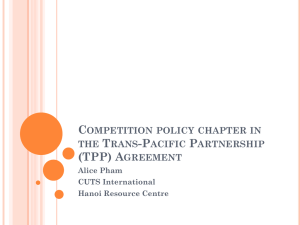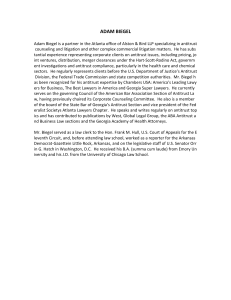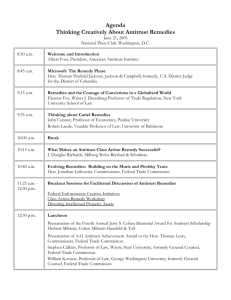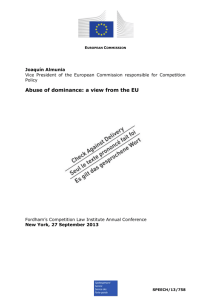A GENERAL ANTITRUST FRAMEWORK FOR DEVELOPING
advertisement
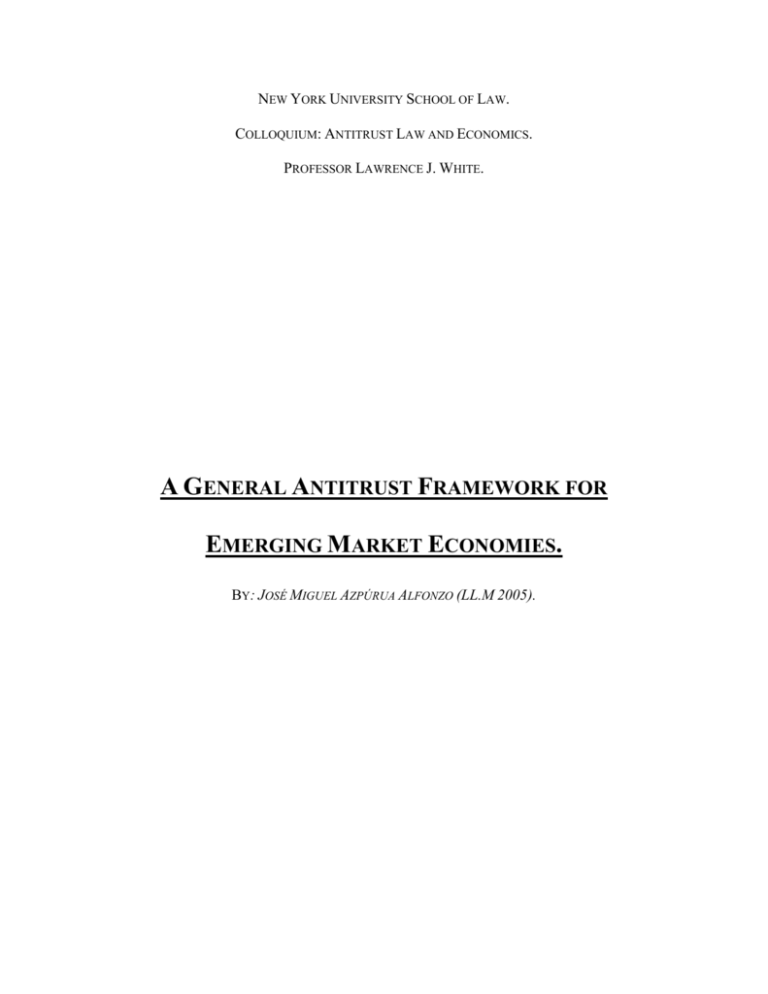
NEW YORK UNIVERSITY SCHOOL OF LAW. COLLOQUIUM: ANTITRUST LAW AND ECONOMICS. PROFESSOR LAWRENCE J. WHITE. A GENERAL ANTITRUST FRAMEWORK FOR EMERGING MARKET ECONOMIES. BY: JOSÉ MIGUEL AZPÚRUA ALFONZO (LL.M 2005). A GENERAL ANTITRUST FRAMEWORK FOR EMERGING MARKET ECONOMIES. By: José Miguel Azpúrua Alfonzo. Executive Summary: The movement for a multilateral competition policy has been the menu a la carte of most academic and governmental institutions, thereby supporting the idea of harmonizing trade liberalization and competition policies under a common scheme, which has been subject to important debates in the international fora. But one of the major drawbacks in such process has been the disparity between the ideological and structural elements of the different economies, and the gap that result from the mismatch between the public economic policies of nations. The present study examines the process that developing countries have to go through as a precondition for being able to actively participate in the development of a multilateral framework of trade and competition: the adoption of competition policy as a prerequisite for a multilateral competition framework. Thus, the main argument presented herein is that the mere adoption of a competition law is not sufficient for developing countries to carry upon a coherent market-based competition policy, and that there are a multiplicity of elements that also need to be created and further implemented in order for a competition policy to be successful, so that it can constitute the proper foundation for multilateral integration. In light of the above, the paper examines the process of adopting a competition policy from its first starting point, up to its structural organization and ulterior implementation: it analyzes the creation of an antitrust framework from the scope of emerging market economies. 2 A GENERAL ANTITRUST FRAMEWORK FOR EMERGING MARKET ECONOMIES. José Miguel Azpúrua Alfonzo.1 1. INTRODUCTION: COMPETITION POLICY AS A PRECONDITION FOR TRADE LIBERALIZATION. The adoption of competition laws has often been regarded as “one of the cornerstones of the liberalization and pro-market reforms that have swept many developing countries.”2 But as these countries have become increasingly aware of the implications of globalization and “the usefulness of controlling global markets” 3, an ulterior challenge arises, which is addressing the disparity between trade and competition under the scope of global markets.4 While trade liberalization on an international scope may expand the territorial consumer reach of firms and thereby imply more competition, it also “entails short or medium term adjustment costs and raises political difficulties.”5 But it may as well increase the need for competition law in developing countries, as trade liberalization has adversely affected small and medium competitors, and has provided the grounds for 1 Abogado (2004), UCAB (Caracas, Venezuela). LL.M Candidate (2005), New York University School of Law. APCBL Candidate (2005), New York University Stern School of Business. 2 Michal Gal, The Ecology of Antitrust Preconditions for Competition Law Enforcement in Developing Countries, at http://lsr.nellco.org/nyu/lewp/papers/10 3 Frederic Jenny, Globalization, Competition and Trade Policy: Convergence, Divergence and Cooperation, Address before the Conference on Competition Policy in the Global Trading System: Perspectives from Japan, the United States and the European Union (June 13, 2000). 4 The term “developing countries” is used broadly, including the least-developed countries. 5 Id. 3 market dominance of few firms, either unilaterally or collusively. 6 Nonetheless, policy makers in developing countries may have the idea that antitrust enforcement can “harm the creation of a technological infrastructure that would enable firms in developing countries to achieve dynamic efficiency and compete in the future in global markets, and that it would strengthen distributive justice concerns.”7 Thus, there is one essential preliminary phase for convergence of trade and competition, which is the requirement that developing countries not only adopt antitrust laws, but that they are willing and able of implementing them effectively, a process that faces many obstacles from different sorts along the way. In this sense, many are the developing countries that have recently undertaken economic reforms that involve “greater reliance of markets and less emphasis on state intervention.”8 These reforms include the underlying aspect of a renewed confidence “that market forces and the individual decisions of consumers and privately owned business[es] can make a greater contribution to economic and social development than an inward-looking centralized economic system”9 6 Michal Gal, The Ecology of Antitrust Preconditions for Competition Law Enforcement in Developing Countries, at http://lsr.nellco.org/nyu/lewp/papers/10 7 Id. 8 Lucian Cernat and Peter Holmes, COMPETITION, COMPETITIVENESS AND DEVELOPMENT: LESSONS FROM DEVELOPING COUNTRIES: INTRODUCTION [UNCTAD/DITC/CLP/2004/1 (2004)]. 9 Id. 4 Most of emerging market economies that have gone through the threshold of abandoning a system of State-paternalistic and highly regulated economy (which leaves little or no ground for the implementation of competition policies, due to the fact that market forces are not in control of essential factors for competition, such as price) have to use Antitrust advocacy powers in order to counteract the institutional bias of government institutions in order for markets to blossom, as it has been the case of Costa Rica and Panama.10 Moreover, since competition policies are often devised to have long run benefits and are generally applied, they may well encounter political obstacles. Also, a proper structural and institutional framework is required for the effective implementation of antitrust, and this may well not fit the agenda of governments that are more interested in investing to achieve short and medium term benefits, ignoring the importance of continuity regardless of the transition of governments. Despite these obstacles, effective antitrust implementation in developing countries is indeed a precondition for the development of international trade liberalization. The Doha 2001 Ministerial Declaration acknowledges this issue and provides that the World Trade Organization and UNCTAD shall assist developing countries in building the necessary capabilities in order for them to actively participate in the process of devising a multilateral framework for the convergence of competition and trade.11 10 Ignacio De Leon, A Market Process Analysis of Competition Policy in Latin America, at http://ssrn.com/abstract=258959 11 Doha WTO Ministerial Declaration (Par.24), WT/MIN(01)/DEC/1 (2001). 5 In the present study we intend to address the manner in which developing countries and others that have progressively opened themselves to global markets, such as China, should adopt competition policies. We will analyze the series of factors involved in such process, basing our study in two main assumptions: First we assume as Professor Gal, that “competition policy is an optimal tool for promoting the economic and social objectives of developing countries.”12 The experience in developed countries has shown very clearly that Competition policy is of the essence for the economic development. “By successfully implementing competition policy, developed nations have significantly reduced inefficiencies in their economies and firms in those countries have invested billions of dollars in research and development, innovation and human resource development.” 13 Thus, it is of utmost interest to determine the degree in which developing countries can learn from the experience of developed countries. For that matter, the present study takes another assumption into account, which is that competition policies have to be developed on a casuistic fashion, thereby taking into account the unique characteristics of each country and the present factors that may not be universally common to other countries. In that sense, this study will aim to extract general guidelines that should rule the creation of an antitrust framework that present a certain range of adaptability to the conditions of each market, aiming towards their effective subsequent implementation. 12 Michal Gal, The Ecology of Antitrust Preconditions for Competition Law Enforcement in Developing Countries, at http://lsr.nellco.org/nyu/lewp/papers/10 13 Menzi Zimelane, Competition Policies in Developing Countries: Dealing with the Challenges, at http://www.compcom.co.za/events/conferences/14%20&%2015%20March%202002%20Conference%20S peeches/Adv.Simelanecomp_law_&_policy_in_a_Dev.coun.htm 6 Since adopting an efficient competition policy does not solely rest in the letter of the law, the present research will also analyze the possible difficulties in implementing competition laws based on the experience in some countries in order to extract important elements to consider when devising it. 2. JUSTIFYING COMPETITION POLICY IN DEVELOPING COUNTRIES. The notion of competition policy refers to a set of government actions oriented to the protection and promotion of competition in a given market. As Richardson stated: “Competition policy comprises measures and instruments used by government[s] to influence ‘conditions of competition’ that reign in the markets.”14 It should be noted that adopting competition law is only one aspect of competition policy, since the latter “covers a whole range of executive policies and approaches, while the [former] is a piece of legislative enactment enforceable in a court of law.”15 In this sense, Adhikari defines competition policy as “[the] ensemble of government actions aimed at protecting and promoting competition in the market[,] [which includes] well-motivated articulation of competition issues in industrial policy, trade policy, investment policy, service policy and consumer policy as well as enactment of competition law.”16 As there is an increasing trend of implementing market-based economic policies David J. Richardson, “Multilateralising Coventions”, in Brookings Trade Forum (R. Lawrence ed., 1998). 14 15 Ratnakar Adhikari, Competition http://www.eldis.org/static/DOC13012.htm 16 Policy Id. 7 in Small Economies, available at undertaken by many countries, there is the subsequent expectation that markets will be increasingly efficient in aiming their efforts towards consumer satisfaction and successfully redirecting their limited resources in order to meet the demands of consumers.17 “As part of this policy change, countries generally establish competition policies. A shift toward market-based policies does little to improve economic growth and efficiency if monopolies are allowed to develop in the newly established markets.”18 One of the pillars of competition policy is the effective implementation of competition laws. As one of the regulatory tools that compose the palette of a competition policy, it aims to limit the competitors’ activities in order to catalyze the resulting anticompetitive effects of private trade barriers, and thereby “ensure that the benefits of competition are not frustrated.”19 Thus, competition laws are part of a broader framework, and cannot be enacted in a manner that isolates them from the other factors that form part of competition policy. 3. FACTORS THAT INFLUENCE THE DEVISE OF AN ANTITRUST FRAMEWORK IN THE CONTEXT OF DEVELOPING COUNTRIES. Many are the problems that one can find common to developing countries: inefficient governmental bureaucracy and institutional structure, excessive State 17 David Smith and Su Sun, Introducing Competition Policy into Developing Economies: A summary of the Lessons Learned, PERSPECTIVES, Vol. 2, No. 4. 18 Id. 19 Michal Gal, The Ecology of Antitrust Preconditions for Competition Law Enforcement in Developing Countries, at http://lsr.nellco.org/nyu/lewp/papers/10 8 regulation and interventionism (and a subsequent lack of competition culture), corruption and little economic development are, among others, the conditions that are initially faced when embracing a free-market system and its ulterior competition policy. In that sense, “the experience of many emerging competition authorities underlines the importance of identifying the specific challenges developing countries face in adopting and enforcing competition law as part of an overall public policy mix in pursuit of economic development.”20 But despite the above, at this point of the analysis it is important to note that there are some inherent risks in adopting competition policies, as expressed by by Khemani and Dutz: "We examine and reject the view that the administration and enforcement of competition law itself must inevitably become a source of intervention in the market, corruption, misuse of bureaucratic power, or cause of market distortions. All of these risks can be dealt with through institutions that incorporate accountability, transparency, checks and balances, and clear rules and procedures. The design and implementation of competition law, and the mix of policy instruments and enforcement priorities must, however, reflect the institutional endowments and technical capacity of countries at different stages of economic development."21 The benefits of a shift towards a market-based economy will not be efficiently 20 Id. 21 R. Khemani and M. Dutz, "The Instruments of Competition Policy and their Relevance for Economic Development", in REGULATORY POLICIES AND REFORM: A COMPARATIVE PERSPECTIVE, (Claudio R. Frischtak ed., 1995). 9 realized unless the competitors are prevented from posing ulterior restrictions in competition. As it is the case of deregulation processes and the so-called monopolies: “Deregulation of previously regulated sectors, including state-controlled monopolies such as utilities and ‘network industries’, for a long time considered for the most part to be ‘natural monopolies’, need to be subject to competition review by competition authorities or sectoral watchdogs to ensure that these firms do not abuse their dominant position in the market. It is now considered likely that competition is possible in markets once thought of as naturally monopolistic, especially telecommunications, but experience worldwide shows us that incumbent monopolists often have tricks up their sleeves to inhibit this.”22 In light of the above, the present study now turns to the analysis of the different phases that developing countries face in adopting and implementing an efficient antitrust framework. 3.1. Preconditions for Adopting a Competition Law. Competition culture determines the degree of success (or failure) of a competition law.23 By examining the experience of some Latin American countries, one can note that it was a common feature in their past to have interventionist industrial policies destined to regulate the essential aspects of the economy, which certainly posed an important barrier 22 Lucian Cernat and Peter Holmes, Competition, Competitiveness and Development: Lessons from Developing Countries [UNCTAD/DITC/CLP/2004/1 (2004)]. 23 Michal Gal, The Ecology of Antitrust Preconditions for Competition Law Enforcement in Developing Countries, at http://lsr.nellco.org/nyu/lewp/papers/10 10 to the development of a competition policy. Thus, if competition laws are inconsistent with the existing socioeconomic ideology of a country, that is to say, if there is no competition culture, the governmental enforcers will lack the necessary incentives to carry upon their effective enforcement. Moreover, this also explains why some countries with competition laws where not able to enforce them accurately during their first years (even decades) of their existence. This was the case of Israel, where not until the government adopted a “pro-market orientation” the legislation began to have a significant impact on the Israeli economy.24 Also, some countries in Latin America had enacted competition laws for many decades (it is noteworthy that Argentina issued its competition law in 1919), but despite their history of competition legislation, the enforcement of competition laws had been inefficient due to the prevailing of government controls and protectionism.25 The cultural values of the region have traditionally been inconsistent with the ideals of a free market based economy, and find their roots in the remote era of colonization.26 Disparity in wealth and the conformation of elites that exercise “rent seeking activities” rather than entrepreneurial goals led to the association of economic 24 Id. 25 Ana Julia Jatar, Implementing Competition Policy in Recently Liberalized Economies: The Case of Venezuela 80 (Antitrust in a Global Economy, Fordham University Law School, Corporate Law Institute.) (Barry Hawk ed., 1993). 26 Ignacio De Leon, A Market Process Analysis of Competition Policy in Latin America, at http://ssrn.com/abstract=258959 11 development with government intervention, which was carried upon “through an unpredictable awkward combination of social forces”27, that implied the clash between elites aiming for an institutional modernization and “private groups exercising rent seeking behaviour.”28 This led to the outcome of highly concentrated market structures in the domestic markets. “Only in the 1990s has there been a revival of antitrust interest in the region, coinciding with the economic reforms implemented to reduce government direct control and to build a market economy.”29 Thus, one can conclude that as minimum ground for the enactment of an effective competition legislation, the government of the country will have to employ a free market based economic policy, which would progressively allow the market forces to control essential factors such as price and also to recognize consumer sovereignty thereby aiming for a better resource allocation that would allow consumer satisfaction as an ultimate goal. Nonetheless, “a competition law should not imply the adoption of competitiveness or economic efficiency as a stand-alone goal”30, since it requires the government to adopt a policy of ultima ratio for regulating of competition, that is, only when such regulatory measures are oriented to the accomplishment of other social objectives that are deemed more important after doing a balancing analysis of the procompetitive versus 27 Id. 28 Id. 29 Ana Julia Jatar, Implementing Competition Policy in Recently Liberalized Economies: The Case of Venezuela 80 (Antitrust in a Global Economy, Fordham University Law School, Corporate Law Institute.) (Barry Hawk ed., 1993). 30 Michal Gal, The Ecology of Antitrust Preconditions for Competition Law Enforcement in Developing Countries, at http://lsr.nellco.org/nyu/lewp/papers/10 12 anticompetitive effects that may derive from such policies.31 3.2. Enacting a Competition Law for a Developing Country. Although countries do not have identical market conditions (“what is appropriate for one economy might not be for another”), there is a set of similarities that provide grounds for a comparative analysis that may allow one country enacting a competition law to learn from the mistakes of their predecessors.32 Despite the above, there has been a tendency to use the antitrust laws of the United States as a model/reference when enacting a competition law, which has led to a subsequent failure in the enforcement stage. Moreover, while enacting a competition law, the legislators should aim to eliminate informal rules that favor the misappropriation of social resources by opportunistic free riders33, thereby guaranteeing a set of conditions under which firms find incentives to compete. Nonetheless, it is evident that there are certain guidelines as to what standards should govern the legality of certain anticompetitive conducts. For example, it is obvious that horizontal collusions oriented to fix prices are plainly anticompetitive and should be subject to strict enforcement. Thus, a per se standard could serve to deal with the 31 Id. 32 David Smith and Su Sun, Introducing Competition Policy into Developing Economies: A summary of the Lessons Learned, PERSPECTIVES, Vol. 2, No. 4. 33 Ignacio De Leon, A Market Process Analysis of Competition Policy in Latin America, at http://ssrn.com/abstract=258959 13 illegality of horizontal restraints such as price fixing or bid rigging.34 However, there are other conducts that do not evidently fall into the realm of plain anticompetitiveness due to the potential procompetitive benefits that may derive from them. This is the case of vertical restraints, which has received a diverse legal treatment in different jurisdictions. While some jurisdictions have adopted analyses that tend to weigh the procompetitive and anticompetitive effects in a casuistic fashion in order to determine the legality of a vertical restraint (such as it is the case of the United States and Europe), there are other legal systems that have adopted general prohibitions for vertical restraints. In this sense, the Brazilian Antitrust Law35 contains a prohibition for distribution restraints as one of many that compose the lists of violations to the economic order that the said law so condemns. In that sense, it is pertinent to examine article 20 which has a general prohibition: “Article 20. Notwithstanding malicious intent, any act in any way intended or otherwise able to produce the effects listed below, even if any such effects are not achieved, shall be deemed a violation of the economic order: I - to limit, restrain or in any way injure open competition or free enterprise; (…)” Thus, Brazilian Antitrust authorities are bound to the statutory rigidity that such a 34 David Smith and Su Sun, Introducing Competition Policy into Developing Economies: A summary of the Lessons Learned, PERSPECTIVES, Vol. 2, No. 4. 35 Brazilian Antitrust Law (Law Nº 8.884/94), as amended by Law Nº 10.149/2000. 14 prohibition implies, leaving little, or even no room for an economic analysis. 36 Ideally, vertical restraints should require additional proof of anticompetitive effects beyond merely declaring the illegality of their existence, since there may well be resulting procompetitive efficiencies that justify them. Another important element when enacting a competition law should be choice of penalties, which has to be individually adopted by countries in accordance to their cultural values. For example, a civil law-based jurisdiction that has institutionally placed competition policy under the legal scrutiny of Administrative Courts would find difficulty in enforcing criminal antitrust sanctions. This have been the case of many Latin American Countries which do contemplate criminal sanctions in their competition statutes, but that rarely impose them. Thus, in developing countries of this sort, the importance of accurately determining proper civil penalties is paramount. As Smith and Sun propose, the probabilities of detection and conviction must be taken into account when establishing the penalties, and thus, “the expected value of the penalty shall exceed the expected value of the illegally obtained profit.” 37 Hence, assuming the certainty of an illegally obtained profit, if there is a small probability of detection and conviction, then the penalties would need to be greater than the value of such illegal profit. As the referred authors illustrate: Where “X” represents the amount of 36 José Miguel Azpúrua Alfonzo, A Global Perspective on Vertical Distribution Restraints and Other Unfair Competition Practices: The Carbonated Soft Drink Industry (2005) (unpublished seminar paper, New York University School of Law) (on file with author). 37 David Smith and Su Sun, Introducing Competition Policy into Developing Economies: A summary of the Lessons Learned, PERSPECTIVES, Vol. 2, No. 4. 15 the profit illegally gained, “if the probability of detection and conviction were 50 percent, the fine would need to be greater than $2X to make the expected value of the penalty greater than the expected gain.”38 3.2.1. Merger Policy in Developing Countries: Justification and Devise. Highly concentrated markets imply an increasing possibility of collusion between firms, and this in itself justifies merger control in developing countries. Nonetheless, lack of competition advocacy has led to some least developed countries to deem merger control unnecessary by believing that it “impedes the restructuring of firms trying to obtain the ‘critical mass’ necessary to compete in world markets, and that having a ‘national champion’ even abusing a monopoly position on the domestic market allows it to be competitive in foreign markets.” 39 Other developing countries simply lack the necessary resources to carry upon the activities that lead to effective merger control. Moreover, there are countries with such small economies lacking industrial infrastructure that it has been argued that they do not require merger control.40 Despite the above, it is evident that “the need for merger-control provisions is greater than the convenience of their absence.”41 It could be the case that the absence of a merger control provision would deprive a country from having the legal grounds to 38 Id. George K. Lipimile, “Competition as a Stimulus for Enterprise Development”, in COMPETITION, COMPETITIVENESS AND DEVELOPMENT: LESSONS FROM DEVELOPING COUNTRIES 183 [UNCTAD/DITC/CLP/2004/1 (2004)]. 39 40 ID. 41 ID. 16 tackle anticompetitive transactions of either national or global scale, therefore having a detrimental impact on the national and global competitiveness of its export-oriented companies, including their so-called “national champions.” Thus, “through mergercontrol regulations, developing countries are able to verify if the efficiencies produced by a merger are sufficient to compensate for the harm to competition.”42 However, all of the above evidences the importance of adopting provisions that allow an analysis of a multiplicity of factors surrounding the transaction, and not just mere structural considerations based on the concentration of the market. In particular, efficiency considerations should be included in the merger analysis, since they contribute to accurately determining whether a specific merger can have a beneficial impact on the investment and employment. Further, in the case of developing countries that have experienced privatization processes, such as Venezuela, Zambia, Colombia, Zimbabwe and Malawi among others, where in some cases there has been a shift from public to private monopolies, there is the risk of takeovers done by foreign firms who deal in the same line of business, thereby leading to the creation of stronger private monopolies, which leads to subsequent market foreclosure. Thus, “the merger-control provisions under national competition law guard against the stifling of enterprise development through anti-competitive mergers.”43 42 Id. 43 Id. 17 An example of the above is the case of the African countries that are members of the COMESA region, in which cross-border transactions have had a tremendous impact in their economies, and therefore merger-control has been justified in monitoring them. “Mergers and other forms of acquisition have accounted for more than 80 percent of direct foreign investment in the Southern African states. The merger-control provision has offered developing countries a facility to monitor and check the entry into the national market of undesirable business [behavior]. This allows domestic firms not to be subjected to anti-competitive business practices which may lead to their demise.”44 Thus, the desirability of including merger-control provisions in developing countries is evident. Nonetheless, merger provisions demand effective implementation of a merger analysis that transcends from mere structural considerations based on sole market concentration, since it would not give accurate results on all the situations. Thus, the need for casuistically analyzing other factors such as resulting efficiencies requires certain capabilities from the enforcement agent in order for the implementation of the provisions to be successful. 3.3. Institutional Considerations: The Enforcement Agency. There is a set of structural factors that are determinant in the development of a successful competition policy. The institutional conditions under which the enforcement body operates will dictate in the degree in which anticompetitive conducts will be effectively sanctioned. 44 Id. 18 The common conditions in developing countries of lack of resources and the inefficient allocation of the scarcely-existing ones, along with corruption, exaggerated bureaucratic organization, lack of advocacy and the functional collapse of the judicial systems, are indeed factors that need to be taken into account when determining the ontological conception of the enforcement body. In this sense, one important task that policymakers in developing countries face is whether to include the antitrust enforcing body within their judicial system, or to create an independent body. Doing so presents the advantage of not having to devise a new institutional framework, and also it allows policymakers to use the existing procedures. This is generally the case of civil law based jurisdictions, in which competition laws are regarded as a subfield of administrative law, and therefore they are included in this jurisdictional (and “competential”) scheme. Nonetheless, it can be concluded that independence of the enforcement body is inversely proportional to the level of competition advocacy of its agents. It is noteworthy that judges may not have the required expertise to properly decide competition law cases, and while it may be argued that procedurally a judge may seek aids on experts, it is important that the enforcer itself has a background that allows him to apply an economic analysis that transcend from the mere mechanical application of the laws. Also, the judicial systems in most developing countries lack credibility from the 19 population, and this may have and adverse impact in the implementation of competition policy. Moreover, the inefficiency of the judicial systems in some jurisdictions of developing countries would make the proper enforcement of competition laws even more difficult. If courts are already saturated with a volume of cases that they are not capable to follow under the timeframes set forth by procedural laws, one can conclude a fortiori that “squeezing-in” the enforcement of competition laws under the existing judicial system in developing countries could be detrimental for the ulterior success of competition policy as a whole. On the other hand, having an independent enforcement body would give the opportunity of having a staff with the proper expertise to carry upon its activities efficiently. However, this evidently presents significant costs, as in the case of developing countries there is a scarcity of the financial resources that are required to support a creation of an enforcement agency capable of efficiently enforce antitrust. But it is evident that having an independent agency presents more benefits than problems in the long run. If the proper capabilities and powers are created and well defined, the enforcement agency could carry upon investigations and solve the collective action problem of disperse consumers and the lack of institutional competence of the judiciary. 3.1.1. The Staff of the Enforcement Agency. It is further important to note the required expertise that the staff of the enforcement body should have. But there are two main obstacles to this matter, which are (i) the lack of proper education systems and human capital in some developing countries, 20 and (ii) the disparity between private and public sector salaries. It is a common situation in some developing countries to have low standards of literacy and poor public education systems. Most of the professional education is carried upon by private institutions, therefore constituting an obstacle for the lower classes to be able to get a professional education, since public universities are scarce and they lack the acquisitive power to pay for an education in a private institution. Moreover, professionals in developing countries tend to seek jobs in private firms due to the disparity in salaries between the public and private sectors. In a country like Venezuela, wages in the private sector even tend to duplicate the ones for the public sector. Also, there is the so-called “brain drain”, which can be described as the tendency for professionals in these countries to migrate into developed nations in the search for better job opportunities and a better quality of life. Also, internet access has facilitated a form of “brain drain” by which professionals work from their home countries for foreign firms and therefore get the benefits of been paid relatively high salaries while still “enjoying” the low costs of life in their home country. All of these factors are detrimental to the human capital of a nation, and therefore make it more difficult to have a proper skilled staff in public institutions. In light of these, gathering professionals to work at an antitrust agency is indeed very difficult. 21 3.1.1.1. Staff Training. While some authors have praised the virtues of creating a good reputation for the enforcement agency as an effective tool for overcoming the aforementioned problems45, it seems that developing countries when devising the institutional framework of their competition policies need to tackle this human resource constraints with a more practical short-term approach, that is, with training. In this sense, Gal expresses: “In the short run, staff training programs in procedural, methodological and substantive matters are key mechanism for overcoming human resource constraints. Such training can be provided internally, but often there is an important role for external training. Internships, or seconded staff from more mature authorities should be arranged to guide staff while gaining practical experience.” 46 Thus, cooperation between agencies and other institutions is an essential activity that provides means for overcoming lack of expertise and thereby developing a wellprepared staff in the antitrust enforcement agency. The experience in Latin America proves the importance of such cooperation, at least on the early stages of the institutional installment: “In their first years, Latin American competition agencies benefited from the international links with antitrust agencies from abroad, and technical support of specialized agencies, such as the UNCTAD, the World Bank and the Trade Unit of the Organisation of American States. This international support consolidated a esprit de 45 Michal Gal, The Ecology of Antitrust Preconditions for Competition Law Enforcement in Developing Countries, at http://lsr.nellco.org/nyu/lewp/papers/10 46 Id. 22 corps among these young agencies, without which the consolidation of the policy would have been far more difficult.” 47 Moreover, assuring that academic institutions get involved in the training process may entail the long-term benefits of having a continuous formation of staff, thereby generating a virtuous cycle. They can do so by assuring that the right courses are offered in their institutions48, and by jointly promoting events with the enforcement agency aiming to the creation and development of a forum that promotes competition advocacy. 4. Conclusion. The creation of a coherent competition policy presupposes the will of the policymakers to place a relevant amount of trust in the market forces, by assuming that free competition would incentive firms to reduce costs and improve the quality of their products, and also generates the pressure for competitors not to be forced out of the market. Thus, one can conclude that for a competition policy to be effective it has to avoid excessive interventionism, and this should be a premise under which policymakers in developing countries should devise their policy agenda. Moreover, a coherent competition policy demands more than just the letter of the law. Policymakers should devise a policy agenda in a tailor-made fashion, having other 47 Ignacio De Leon, A Market Process Analysis of Competition Policy in Latin America, at http://ssrn.com/abstract=258959 48 Michal Gal, The Ecology of Antitrust Preconditions for Competition Law Enforcement in Developing Countries, at http://lsr.nellco.org/nyu/lewp/papers/10 23 jurisdictions as a reference to the extent that some of their characteristics are analog to them, but avoiding the copy/paste of provisions that don’t necessary fit into the reality of the economy in hand. Further, the process of enacting a competition law should reflect the policy goals set forth: the law should be the materialization of the policy. In this track of thoughts, devising an agenda and issuing a competition law are merely the foundational steps of having a competition policy, since policymakers also have to create the organizational/institutional framework that would provide the necessary structural capabilities for the effective implementation of the competition policy. Thus, the competition agency of a developing country should aim to have the necessary advocacy powers and independence to be able to challenge anticompetitive practices emanating from both the private and the public sector. The agency staff needs to have the necessary skills to enforce the policy proactively, and also to carry upon a constant analysis of the economic effects of the conducts reviewed on each case. This evidences that the process of devising a competition policy is in itself costly, and thus it needs to be well funded. Although this is a major problem in developing countries, it should be a preliminary consideration that policymakers ought to take into account. In this sense, proper budgeting and funding from the initial steps will prove to be an essential factor that would determine the proper implementation of the policy at the long run. 24 At last, the enforcement agency should aim to promote the competition policy in a way that would cause a social impact enough to educate the competitors and consumers of the virtues of free competition. Credibility in the agency is indeed a precondition for the success of the competition policy. Thus, until developing countries have the proper grounds for the effective sustainability of a free market economy, the idea of a multilateral framework of competition and trade seems distant. Competition policy, more than a mere competition law, is the essential precondition for that process to happen, and developed countries should commit to assisting developed countries in this preliminary process. The work of institutions like the ICN, the OECD and UNCTAD has not only contributed to raise awareness of this necessary preliminary work, but have also served as fora for the integration and cooperation among participants. 25

